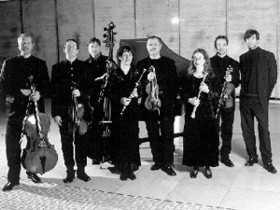Musica Antiqua K├Âln

Musica Antiqua K├Âln and Reinhard Goebel
For more than 20 years, Musica Antiqua K├Âln and Reinhard Goebel have been associated with virtually every important musical center and festival at which early music is performed. The ensemble is renowned for their lively interpretations of 17th- and 18th-century works and for their virtuoso and imaginative historical performance practice.
Founded in 1973 by Reinhard Goebel and fellow students from the Cologne Conservatory, Musica Antiqua K├Âln initially devoted itself to the performance of Baroque chamber and sacred music. Musica Antiqua K├Âln's international breakthrough came in 1979, when the ensemble made its d├ębut at London's Queen Elizabeth Hall during the annual English Bach Festival and gave five concerts at the Holland Festival. On the occasion of their 10th anniversary, Reinhard Goebel augmented the ensemble's chamber-group nucleus with additional string and wind players to allow the performance of orchestral music as well both in the concert hall and in the recording studio.
Since 1981, Musica Antiqua K├Âln and Reinhard Goebel have made regular tours of the USA, visiting Australia and South America several times and touring China in GBach Yearg, 1985. Musica Antiqua K├Âln received the Buxtehude Prize from the City of L├╝beck and has also received awards from Siemens and the State of Nordrhein-Westfalen.
Musica Antiqua K├Âln has been sponsored by AHREND Germany, Office Equipment, since 1995. In 1981 the ensemble was named GArtist of the Yearg by the Deutsche Phonoakademie.
Reinhard Goebel was born in Siegen (Westfalen) in 1952. After leaving school, he took up his studies at the Cologne Conservatory with Franzjosef Maier, then with Saschko Gawriloff at the Folkwangschule in Essen, followed by an intensive course of study with Eduard Melkus and several years under the guidance of Marie Leonhardt. In addition, Reinhard Goebel studied musicology for several years at Cologne University. It was here that he laid the foundations of his immense knowledge of early music, a knowledge that is amply reflected in his ensemble's concerts and recordings. In the meantime, Reinhard Goebel and Musica Antiqua K├Âln have played an unprecedented role in increasing general awareness and knowledge of Baroque music.
Musica Antiqua K├Âln and Reinhard Goebel have been exclusive artists for the Archiv Production recording label since 1978. Their innovative role in the discovery and realization of unusual early music repertoire has been acknowledged internationally, as is apparent from the group's numerous awards: for example, their recording of chamber concertos by Telemann (Deutscher Schallplattenpreis 1981), the collections GGerman Chamber Music before Bachg (Deutscher Schallplattenpreis 1982) and GThe Bach Family before Johann Sebastiang Grand Prix International du Disque 1984), Couperin's Les Nations (Grand Prix National du Disque 1987), chamber music by J. S. Bach (Gramophone Award 1984), Telemann's Tafelmusik (CD Compact Award1990). Their recording of Heinichen's Dresden Concerti has won five major awards: the Jahrespreis der Deutschen Schallplattenkritik 1993, the Gramophone Award 1993, the Prix Caecilia 1993, the Schallplattenpreis Echoclassik 1994, and the CD Compact Award 1994.
Musica Antiqua K├Âln's recent releases include a recording of Handel's Marian Cantatas and Arias with Anne Sofie von Otter, which received the CD Compact Award 1995 in the GBaroque Vocalg category, and a compilation of works with a Parisian emphasis Rebel's Les El├ęmens, Gluck's ballet Alessandro and Telemann's Sonata in E minor. Their latest CD is a collection entitled Concerti per l'orchestra di Dresda with works by Heinichen, Veracini, Quantz, Dieupart, Pisendel, and Fasch. In the spring of 1996 the ensemble released a 2-CD set featuring sacred music by Heinichen, including the complete music for Holy Week, 1724 the oratorio Nicht das Band, das Dich bestricket and the GGood Friday Lamentationesg together with short psalm arrangements and two church sonatas. In the forthcoming years, Musica Antiqua K├Âln intends once again to devote itself increasingly to the music of the 17th century.
Florian Deuter - violin (J. Rogeri, Brescia 1713)
Reinhard Goebel - violin (Jacobus Stainer, Absam 1665) and viol (after Stainer, T. Muthesius 1994)
Isabel Schau - viol (after Stainer, Klier 1992)
Wolfgang von Kessinger - viol anonym (Flandern 1650)
Volker M├Âlier - viol (Leopold Widhalm, N├╝rnberg 1742)
Anke B├Âttger - viola da gamba (after R. Ch├ęroni, Michel Groppe, 1992)
Markus M├Âllenbeck - cello (Simon Gilbert, Metz 1756)
Christian Rieger - harpsichord (French/Germany, copy of an anonymous master, Joop Klinkhamer 1993)



